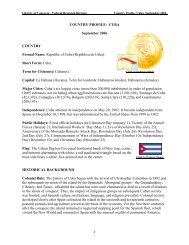1 - American Memory
1 - American Memory
1 - American Memory
Create successful ePaper yourself
Turn your PDF publications into a flip-book with our unique Google optimized e-Paper software.
204<br />
borders, out of reach of Hawaii State law and Hawaii public opinion.<br />
A final possible criticism is that affirmative action on H.R. 7189<br />
could precipitate demands for legislation of broader application. The<br />
slippery slope argument is familiar to all of us, but equally familiar<br />
is the understandilng that extraordinary circumstances require an<br />
extraordinary response. In my view, this is such an occasion.<br />
H.R. 7180 18 BOTH ESSENTIAL AND APFROPRIATE LEGISLATION<br />
H.R. 7189 is an effective and timely response to a longstanding<br />
problem of great seriousness and vital importance for the people of<br />
Hawaii. It will provide an essential measure of protection for nearly<br />
a million <strong>American</strong> citizens who, because of unalterable geographical<br />
circumstances, are uniquely dependent upon one mode oi transporta-<br />
tion and therefore uniquely vulnerable to disruptions of that service.<br />
I have documented the impact of shipping tieups on Hawaii—^the<br />
lost jobs, rising prices, depleted savings, economic disruption and<br />
blighted hopes. Recent history conclusively shows that the possibility<br />
of such stoppages on the west coast is regularly transformed into a<br />
reality.<br />
There is no doubt of the inadequacy of Taft-Hartley to safeguard<br />
Hawaii, both because of its spectacular lack of success in resolving<br />
shipping disputes and because of its national emergency requirement,<br />
which a regional dispute cannot satisfy until verv late in the day, if<br />
at all.<br />
Congress has rarely responded to Hawaii's plight when our ocean<br />
lifeline has been severed. Wlien Congress has responded, that response<br />
has been tardy and has been dependent upon a i-emarkable constella-<br />
tion of supportive events, as was made clear during the 1971—72 west<br />
const longshore dispute.<br />
My colleagues and I from Hawaii have been searching for some<br />
time for a remedy which will effectively protect Hawaii, against cir-<br />
cumstances beyond her control or sphere of influence, which will be<br />
acceptable to the Congress, and which will not tip the scales against<br />
either labor or management. In H.R. 7189 and S. 1566, we feel we have<br />
found that remedy. Since both organized labor and the employers<br />
bargaining group involved in west coast shipping contracts oppose<br />
these bills on the grounds they favor the other side, it appears that<br />
this legislation is, in truth, even-handed. The action of the Senate in<br />
passing S. 1566 by a solid majority indicates broad agreement that<br />
this is so.<br />
I do not anticipate that H.R. 7189 would be used other than with<br />
great caution in a limited number of instances, and it would have, as<br />
I have indicated, a very limited impact on the collective bargaining<br />
process.<br />
Affirmatively, however, this bill would do what is essential to alle-<br />
viate hardship in Hawaii and the other U.S. Pacific Islands when<br />
labor-management disputes on the west coast cut our ocean lifeline.<br />
The people of Hawaii are watching the deliberations of this sub-<br />
committee.<br />
They remember the many, many strikes of years gone by and their<br />
impact on themselves and their enterprises.



![Albert Einstein Papers [finding aid]. Library of Congress. [PDF ...](https://img.yumpu.com/21604228/1/190x245/albert-einstein-papers-finding-aid-library-of-congress-pdf-.jpg?quality=85)





![American Colony in Jerusalem Collection [finding aid]. Library of ...](https://img.yumpu.com/17941275/1/190x245/american-colony-in-jerusalem-collection-finding-aid-library-of-.jpg?quality=85)



![Piccard Family Papers [finding aid]. - American Memory - Library of ...](https://img.yumpu.com/17941234/1/190x245/piccard-family-papers-finding-aid-american-memory-library-of-.jpg?quality=85)


